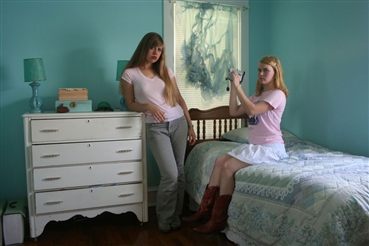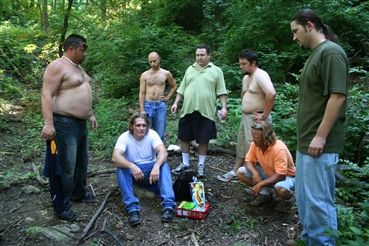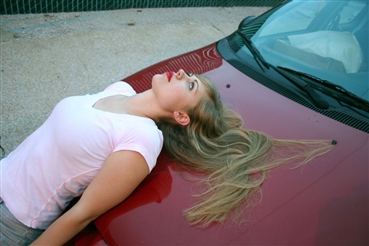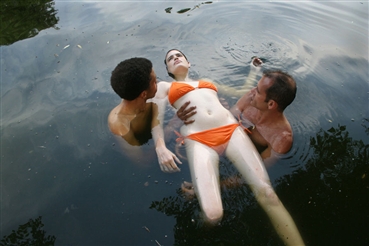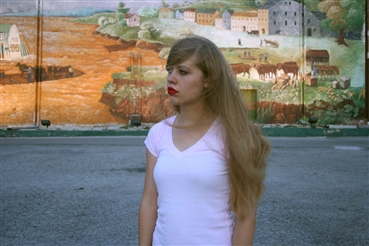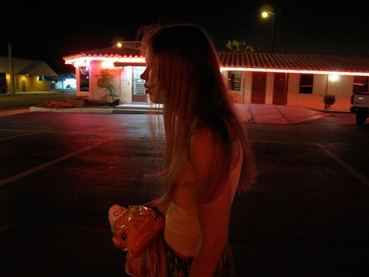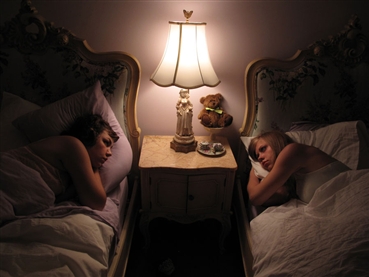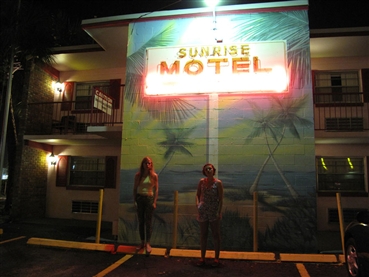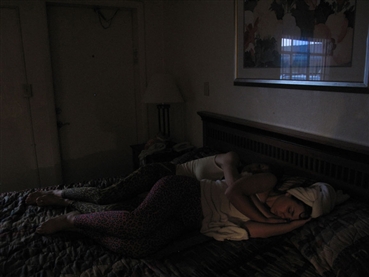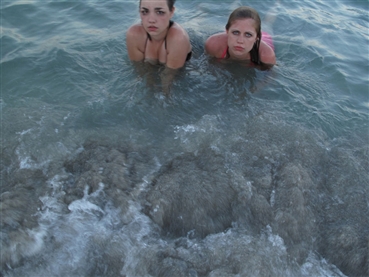Beg For Your Life: In the Well with Laurel Nakadate
Mary Gaitskill February 24, 2011
I am getting into this by going the long way around.
Once when I was driving in my car, I heard a story by Ira Sher read on the radio. I don't know if I remember it accurately because I was driving and it was a long time ago. It was an amazing story, but still, it was just a story and so for a long time I forgot it. It came back with a lot of force when I saw Laurel Nakadate's 2009 film Exorcism In January. I am not sure why.
Sher's story is about a bunch of restless kids who live in some small town in a desert. The narrator's home life is screwed up in some way. I don't recall exactly how, maybe divorce. For fun, he goes with his friends to explore in the desert, and one day they discover something dramatic: a guy trapped at the bottom of a dry well. He pleads with them to get help, and instead, they go home and make up a basket of food with water for him. He is very thankful and asks when help is coming. They are non-committal. This goes on for a few days. The man starts to get desperate. He says, “You told your parents, right? Help is coming, right?” They don't really answer. It's not that they don't care. It's more that it's very exciting to have him as their special thing.
There is no literal connection between Nakadate's film and Sher's story. Exorcism In January is not about kids or abandonment; it is in a strange way about friendship. In the film, Nakadate plays a girl in a hot pink bra who wakes up in a near-empty room of light, puts on cowboy boots and goes to visit a middle-aged guy who looks like an old guy who lives in a dark, dirty apartment lit like a Dutch masterpiece. She asks him how he is and he says he's pretty down. She asks why and he says it's a chemical imbalance in his brain. Or maybe a demonic possession. Maybe an exorcism would help, he says; maybe she could pray over him and shake rattles and drive the spirits away. She asks when he wants to do it and he says tomorrow. She says okay and she leaves; his eyes follow her out. The next day she wakes again in her room of light and puts a pink shirt over her pink bra and puts on her boots. He is lying on his bed in his dark chaotic room. You hear her voice, and it is the voice of a child; she is saying, “Go away spirits, go away,” and he is repeating her words and shaking his hands while his cat licks itself. “Shake them out,” she says. “Lick them out. Bad spirits go away.” “I don't want you here,” he says, “Go away.” She kneels by his bed and says, “Go away.” The next day she wakes, again in underwear, in bright light. She goes into his dark apartment and asks if he's better. He says, yes, he is. He thinks the exorcism worked. She says he should give an acceptance speech “about how great it is.” He does, sort of.
The kids in the story keep bringing the man food and water, but they never tell their parents. They don't tell because they are afraid they will get into trouble for not telling. Eventually he realizes what is going on. Eventually he asks, what are your names? One of them answers without thinking and the others go, “Shhh!” And they go away.
Laurel Nakadate wrote and directed The Wolf Knife, which is about two 16-year-old girls named Chrissy (Christina Kolozsvary) and June (Julie Potratz) who decide to go to Nashville to find Chrissy's father. They decide to do this after Chrissy's mom tells them there is a rapist in the neighborhood with a gun; immediately after she tells them this, the mom's boyfriend proposes. The boyfriend pulls a diamond ring out of his shirt pocket, the same pocket from which he earlier pulled a pair of underpants which he gave to Chrissy. He says he wants Chrissy's mom to be his princess forever. He keeps saying princess, not queen, even though Chrissy's mom is not young. The girls get up and leave in disgust. Later they lie in twin beds, and Chrissy tells June that she's heard her mom and the boyfriend having sex and that they say gross, aggressive things; the boyfriend says “Beg for your life.” June laughs and Chrissy snaps at her. Chrissy decides they should go to Nashville to look for her dad; they flee in the dead of night.
Nakadate does not act in this film but the actress who plays Chrissy is a dead-ringer for how we might imagine Nakadate at 16. (I don't know why this seems to matter but it does.) She is an intensely physical person this girl, and its a willful, intelligent physicality, like her body came into the world knowing things, not specifically carnal things, but deep, complicated things. Her dark, thick-lashed eyes, though, have the questing, hurt look of someone who knows but doesn't quite want to believe what she sees, and is looking to find something less...well, less insane. It's the expression of someone who's socialized mind isn't prepared for what the rest of her is taking in.
June is less powerfully physical, with more question than knowledge in her limbs. Her eyes are beyond questing, they are yearning, blindly, with no idea what for. Chrissy is clearly the dominant one between them, with far greater will and imagination. What the two have in common, what makes them seem like sisters, is the beautiful way they inhabit the fecund density of adolescence in bloom. Nakadate drenches the viewer in this quality with her close-ups; through the intensity of her gaze, the girls bodily express vital, amoral goodness, good as a plant or animal is good just by being what it is. Done up in wet, shiny lipsticks, heavy eye make-up and tight, neon-colored clothes, the girls radiate, in their skin, lips and eyes, the abiding purity of a primary impulse seeking to find a shape in the bizarre landscape of 21st-century humanity. It's not just the girls either. Grass, trees, animals, people—everything in Nakadate's world is burstingly alive and bright with the need to be what it is. There is an almost tragi-comical tension between this ferocious, innocent need and the perversity of the human culture/character through which it must come; it is a tension that at some point, and repeatedly, will become anguished.
As it turns out, Chrissy isn't looking for her father. She's going to visit her retired third grade teacher who she says is a really nice guy. June hates this and wants to go back home. But without Chrissy, she is simply not resourceful enough. So they go see Mr. Dews. Nearly an old man now, Mr. Dews is living with his elderly father; he looks a louche ruin, like years of disappointment have crushed him into the shape of an elegant troll. And yet—within this shape, he still wants and seeks to be. His voice is a nightmare of nuance, full of humor and horror, and with it he croaks at Chrissy as from the bottom of a pit. And then he pulls her in. Their dialogue is a masterpiece of misshapen, mixed-up emotion, crashing from tenderness to rapacity to loathing to longing to pity to remnants of real affection and respect which pathetically shimmer—and then are violated all in the tonal changes of the wretched man's voice. The visit ends with Chrissy squashed up against a mirror, confessing something that June did that she wishes she could've done. Her third grade teacher is devouring what he thinks is her innocent shame and she is feeding it to him. As awful as this is, it may be preferable to what she really feels, for her shame is in being unwanted and hating June for it.
But it's June who cries. She cries and won't say much to Chrissy, who feels guilty and so begins to bully her friend with cruel little gestures, like forcing a straw into her mouth and commanding her to “drink more.” June finally fights back—and then the wolf knife comes out. And still the girls' skin and eyes and lips continue to seek, to yearn, to be. As does the earth and grass and sky around them, with heart-breaking amoral goodness.
In her 2006 film Beg For Your Life, Nakadate is a girl who points guns at old guys and says “Beg for your life!” It's for laughs; a lot of other stuff happens—old guys kidnap the girl and she kind of makes one of them kill her except she's not dead. Music plays; the last song is about “making love out of nothing at all.” But because the film is called “Beg For Your Life,” I'm thinking that's the highlight. The girl seems to really like saying it, and the old guys seem to really like it too. One of them starts cracking up laughing in the middle of it, and how could he not, it's ridiculous funny, weird-sweet and also a little bit horrible. These old guys aren't actors professionally. They are old guys she met in places like the Home Depot parking lot, who came up and talked to her because she's pretty. Some of them are mentally ill. Many of them she came to know well.
I never got to hear the end of Ira Sher's story because I had to get out of the car. In the last part I did hear, the narrative had shifted away from the man in the well to the protagonist's problematic home life. So I don't know what happened. My guess is that they left him down there. Maybe at the end the narrator went back and shouted down and got no answer. But I don't know. It was a great story anyway.
Someone I know who saw The Wolf Knife before I did described it as being about “girls making bad choices.” Which is true. Except that in the world of The Wolf Knife, there really don't seem to be good choices. In the world of The Wolf Knife there are swimming pools full of lapping light and soft plapping sounds, there are peacocks and flowers and bright blue lawn chairs and unless you are perfect you will need an ass lift when you are 26; your sweating blank-eyed mother dances joylessly in the attic and her boyfriend pulls panties from his pocket. There is ice cream and giant wooden pictures of water and sky; white prisoners are more glamorous than black prisoners and the cute guy you like only wants a hand-job from you and then you never talk again, but the other cute guy fucks your friend and she doesn't even tell you; the light turns your friend's skin orange and yellow and you are orange and yellow too, and her eyes are all occluded. You make her lie on her back on a dinosaur statue in public so her crotch bone sticks out and take her picture. Mr. Dews says, “Legs and hips and shoulders and eyes and lips and ankles and hair and eyebrows and nose” in the dirtiest voice you've ever heard and you can see what he means even though he is talking about you. Your mother's engagement ring comes out your mouth. Somebody is down in a hole and people know and no one knows. Sometimes you think you know who it is and sometimes it is someone else. Sometimes it is you. It is horrible. And it is amazing.
Mary Gaitskill is the author of two novels, mostly recently Veronica and three books of stories, most recently Don't Cry. She is currently working on a novel called The End of Seasons.
Editor's note: This article is the first in a series commissioned by SF360.org to accompany KinoTek programs at the San Francisco Film Society. The KinoTek programming stream is dedicated to presenting interdisciplinary, emergent and cross-platform time-based visual media.
The San Francisco Film Society presents a multiplatform presentation of the work of American multimedia artist Laurel Nakadate, February 23–March 2. Fever Dreams features theatrical screenings of Nakadate’s two feature works February 24, the presentation of a number of her shorter videos in nontheatrical venues beginning February 23 and a collectible poster featuring her photography in the February 23 edition of the San Francisco Bay Guardian. More at sffs.org. KinoTek is supported by a generous two-year grant from the Andy Warhol Foundation for the Visual Arts.


-
Oct 21, 2011
Friday
In Orbit with ‘An Injury to One’
Accompanied by a program of solar system shorts, Travis Wilkerson’s 2003 look at ruthless union-busting and the rise and fall of Butte, Montana, offers eerie resonance.

-
Sep 29, 2011
Thursday
Turturro Makes a Case for 'Passione'
John Turturro shares his passion for the Neapolitan songbook.

-
Sep 23, 2011
Friday
Guy Maddin: Ann Savage and the Osmonds
Guy Maddin talks about movies, writing, himself—and the allure of the Osmonds, re-published on the occasion of Fandor's Maddin blogathon.

-
Sep 16, 2011
Friday
Tiffany Shlain Connects the Dots
With 'Connected,' Tiffany Shlain weaves hope into a high risk story.

-
Sep 10, 2011
Saturday
Iranian Teenage Love Sparks ‘Circumstance’
Director, producer speak of challenges, inspirations behind a story of the urban Iranian underground.

-
Sep 9, 2011
Friday
‘Puzzle’ Pieces Together a Life
Maria Onetto quietly dazzles in Argentine film about a midlife jigsaw puzzler.

-
Sep 7, 2011
Wednesday
Radical Light: ‘Movie Factory’
As an appreciation of George Kuchar's inspired presence, we offer up the filmmaker in his own words, excerpted from 'Radical Light: Alternative Film and Video in the San Francisco Bay Area, 1945–2000.'

-
Aug 31, 2011
Wednesday
Sjogren Finds ‘Redemption’ in Petaluma
Britta Sjogren gets a second chance to make a film about how people rebound from trauma.

























